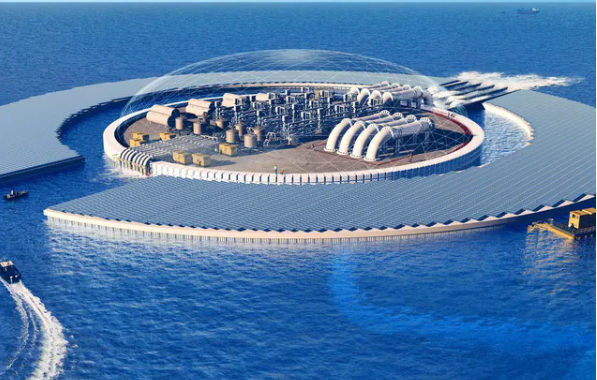November 27, 2025 | 18:10 GMT +7
November 27, 2025 | 18:10 GMT +7
Hotline: 0913.378.918
November 27, 2025 | 18:10 GMT +7
Hotline: 0913.378.918

A rendering of what ocean-based climate tech could look like. Caltech researchers are developing technology to filter CO2 out of seawater to allow oceans to absorb even more of the greenhouse gas. Image: Caltech
More than 200 scientists have signed onto a letter pushing for “responsible” research into ways to trap planet-heating carbon dioxide in the world’s oceans. They want to take urgent action on the climate crisis, while making sure they don’t trigger any new problems by relying on oceans to help in the fight.
Polluters have trashed the world’s atmosphere with carbon dioxide emissions from fossil fuels. That blanket of pollution is already warming the planet and causing more extreme weather disasters. One way to keep climate change from getting worse is to take some of those historic emissions out of the atmosphere.
Oceans already do that for us, absorbing and holding around 50 times more carbon than the atmosphere. What if humans could supercharge that ability?
That’s what scientists want to better understand, along with any side effects that might come with messing with the chemistry of our oceans. Startups are already developing new technologies to sequester more CO2 in the sea. But there’s still a lot we don’t know about what impact that might have or what strategies might be most successful, the letter says.
“While ocean-based carbon dioxide removal approaches have enormous potential, there are also risks,” the letter says. “Society does not yet have nearly enough information about the effectiveness or impacts of any specific approach and so cannot make informed decisions about their use at scale.”
There’s a whole spectrum of ways to boost the ocean’s ability to absorb and hold carbon dioxide. Some are natural, like restoring coastal ecosystems that draw down CO2 through photosynthesis. Other strategies are more technology-driven. A couple of California-based startups have built pilot plants to filter CO2 out of the ocean, for example. The idea is that taking CO2 out of the world’s oceans will free them up to absorb even more of the gas.
These are all pretty early efforts, and hacking the high seas is no replacement for preventing greenhouse gas emissions from accumulating in the atmosphere by ditching fossil fuels. Some environmental advocates are also worried about new CO2-filtering technologies harming marine life.
The letter today calls for controlled field trials to evaluate carbon removal strategies, along with a third-party review of the results. There also need to be safeguards in place to address any “unintended or adverse consequences” and inclusive policies to engage different stakeholders.
Some big names in climate and environmental sciences have signed on. That includes David King, former chief scientific adviser to the UK government between 2000 and 2007. James Hansen, a former NASA climate scientist famous for warning the world about climate change during a 1988 testimony to Congress, has also signed the letter.
Oceans have already taken a huge hit from climate change. A heatwave in the Atlantic is decimating Florida’s coral reefs this summer, for instance. Scientists are so worried about a mass die-off that they’ve raced to take corals out of the sea to keep in land-based labs until it’s safe to return them to the water. After all, what happens offshore affects communities on land, too. Florida’s coral reefs provide an important buffer from storm surges and a home to thousands of species that are important to the local economy.
“I have seen these massive declines in ocean health ... Doing nothing is unethical, essentially,” says Débora Iglesias-Rodriguez, Ecology, Evolution, and Marine Biology department chair at the University of California, Santa Barbara, who signed the letter released today.
When it comes to studying new ways to use oceans to tackle climate change, she says, “We need to at least figure out the risks and the benefits, see whether we can help resolve the problem we have created.”
(The Verge)

(VAN) A new study reveals how the simultaneous effects of ocean acidification, salinity and loss of oxygen are making the world more fragile.

(VAN) Hopes are growing that the creation of the first 3D turkey gut model could be a turning point in the battle against the virulent blackhead disease.

(VAN) Tyson, America’s biggest meat supplier, plans to shutter one of its largest beef processing plants as the industry continues to struggle with low cattle supplies and political pressure from Washington.

(VAN) New FAO study shows how digital solutions are empowering farmers and fishers to prevent losses and build resilient agrifood systems.

(VAN) Brazil's COP30 presidency pushed through a compromise climate deal on Saturday that would boost finance for poor nations coping with global warming but that omitted any mention of the fossil fuels driving it.

(VAN) Poultry farmers in the UK have been warned that they could face one of the worst winters yet for bird flu.

(VAN) Prices of main-crop paddy have risen sharply, with jasmine rice hitting 16,100 baht per tonne — the highest level in years.